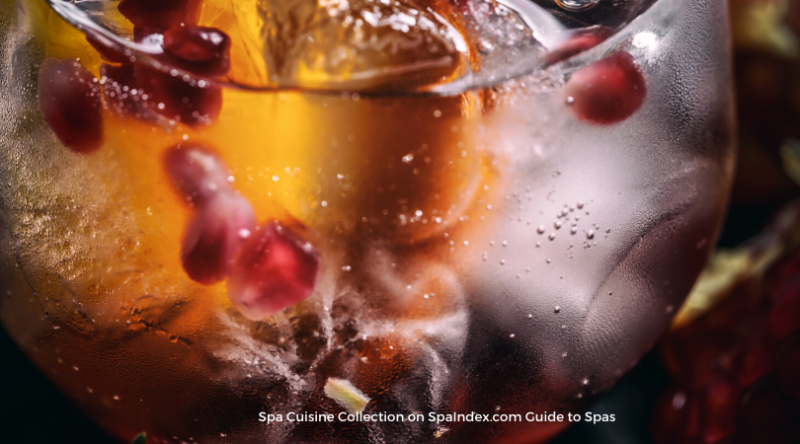Pomegranate Ginger Elixir
Pomegranates are a new superfood: They are high in vitamin C and potassium, a great source of fiber, and low in calories. Take advantage of a SuperFood with this lively elixir, perfect for breakfast or in place of a cocktail at parties. We use 1/2 package of seeds for this recipe from the La Costa Resort & Spa in Southern California. You may also buy 100% pom juice, and proceed, starting with approximately 1 cup, and adjusting to your taste.
The pomegranate has been cherished for its exquisite beauty, flavor, color, and health benefits for centuries. From its distinctive crown to its ruby red arils, the pomegranate is royalty amongst fruit. It is symbolic of prosperity and abundance in virtually every civilization.
The name “pomegranate” derives from the Middle French “pomme garnete” – literally “seeded apple.” It is also sometimes referred to as a Chinese apple. Many scholars believe that the forbidden – yet irresistible – fruit in which Eve indulged within the Garden of Eden was actually a pomegranate (and not an apple).
Pomegranate juice is high in three different types of polyphenols, a potent form of antioxidants. The three types – tannins, anthocyanins, and ellagic acid – are present in many fruits, but fresh pomegranate juice contains particularly high amounts of all three.
Poms are generally available in Fall to Winter months, when they are at their best.
Ingredients
- 2 large pomegranates (seeds removed) (or 1 cup arils)
- ½ cup honey
- ½ cup fresh ginger (peeled and grated)
- 2 tablespoons spearmint leaves
- 2 cups mineral water
Instructions
- Combine pomegranate seeds with honey, ginger, and mint leaves in a noncorrosive saucepan.
- Stir well, for about 3 minutes, crushing the pomegranate seeds into the mixture.
- Add water and bring to boil over moderate heat.
- As soon as the mixture comes to a boil, remove from heat and allow to cool for about 15 minutes.
- Strain, chill, and serve over ice with a mint sprig as garnish, and any errant seeds left over.
Nutrition
With thanks to the POM Council for resource data. Visit POM Council for more recipes.


